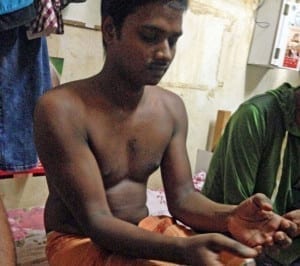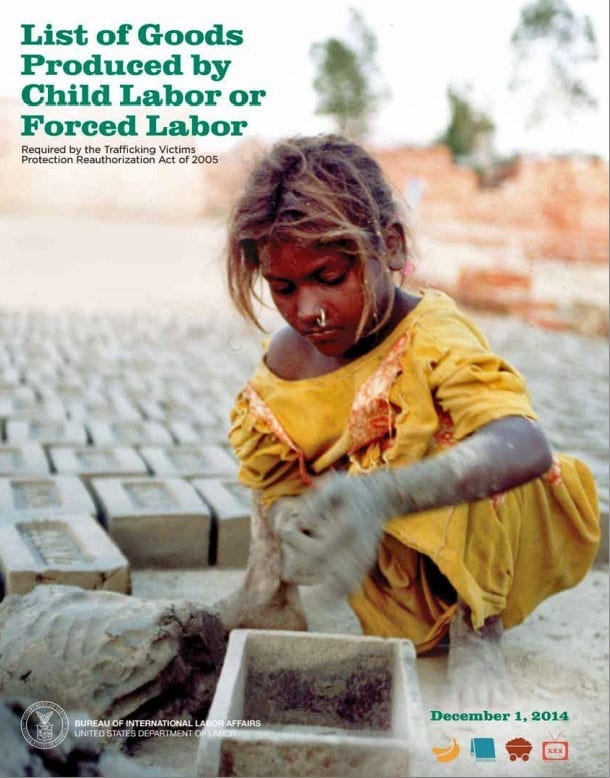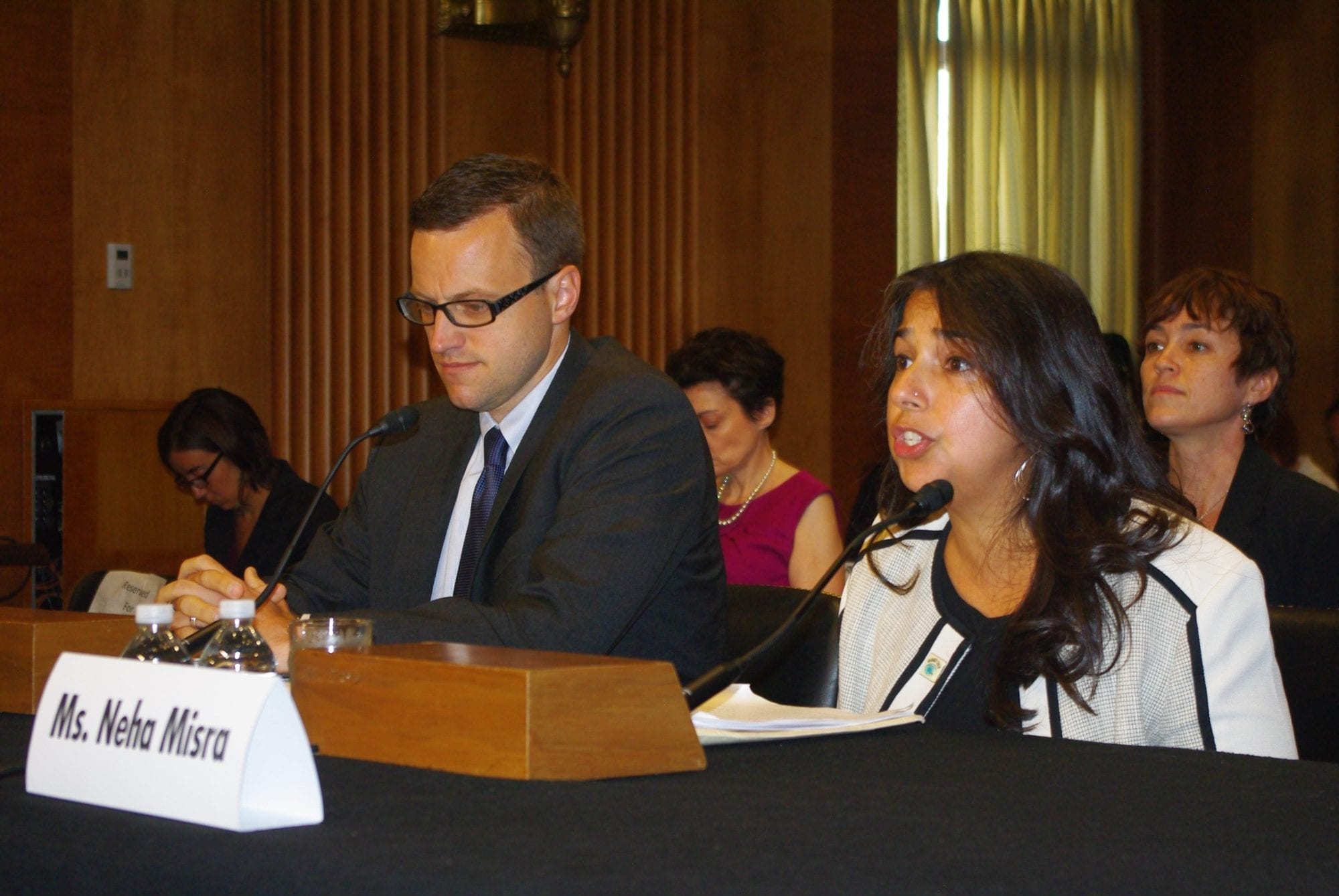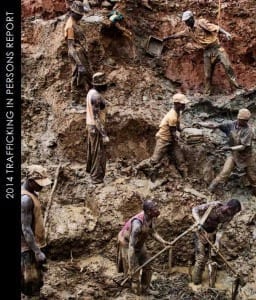
Jul 27, 2015
Thailand is failing to comply with minimum standards to address human trafficking, while Malaysia is “making significant efforts” to eliminate human trafficking, according to the U.S. State Department in its annual Trafficking in Persons Report released today.
The State Department retained Thailand on “Tier 3,” the report’s bottom ranking, and upgraded Malaysia from Tier 3 to the “Tier 2 Watchlist.” The State Department also upgraded Uzbekistan from Tier 3 to the Tier 2 Watchlist. Countries receiving “Tier 3” rankings are subject to withholding or withdrawal of U.S. non-humanitarian and non-trade-related assistance.

Speaking with union representatives, a migrant worker in Malaysia describes deplorable working conditions. Credit: MTUC
In May, hundreds of bodies were found in 139 mass graves at suspected human trafficking camps on the border of Malaysia and Thailand. According to local news, Malaysian border patrol knew about the camps for 10 years, says Karuppiah Somasundram, assistant secretary of education for the Malaysian Trades Union Congress (MTUC). No arrests have been made.
“Why (doesn’t the government) charge them and show the world something has been done? The local television said most of the deaths were due to hunger. You left them to die like that?” asked Karuppiah.
Since January, the MTUC and the General Federation of Nepalese Trade Unions (GEFONT), both Solidarity Center allies, have documented hundreds of cases of employer abuse of migrant workers in Malaysia, often rising to the level of forced labor. Many of these workers, from India, Nepal, Sri Lanka, China and elsewhere, report that their employer had not paid them, or had given them wages far below what they had been promised before leaving home.
The widespread abuse reported across industries and by large numbers of workers demonstrate that these cases are not isolated incidents involving rogue employers, but workplace practices condoned within an officially sanctioned environment that denies fundamental human rights. A Wall Street Journal report today describes the slave-like conditions of migrant workers at Malaysia’s palm oil plantations. Karuppiah says the government employs few labor inspectors, making it unlikely they will travel to far-away plantations to look for workplace violations.
“Our allies in Malaysia are telling us there is still massive exploitation of migrant workers and rampant abuse of their rights,” says Solidarity Center Executive Director Shawna Bader-Blau. “Migrant workers are beaten, held against their will, often unpaid and forced to live in unsanitary conditions, without running water, electricity or even mattresses to sleep on.”
“Many employers are still wrongly holding on to passports and work passes/visas/permits,” the MTUC said in a statement. “When workers claim their rights through existing legal avenues, many employers simply terminate their workers, and for migrant workers this also mean the loss of ability to stay in Malaysia which is a requirement in law if they want to pursue their claims for justice.”
In Uzbekistan, teachers, doctors and other medical staff are forced to take part in the country’s cotton harvest for several weeks at a time, a coerced mass mobilization of millions that involves extortion and bribery, according to a report released earlier this year by the nonprofit Uzbek-German Forum for Human Rights.
Last month, an Uzbek human rights monitor says she was arrested and assaulted as she sought to document the Uzbek government’s forced mobilization of teachers and doctors to clear weeds from cotton fields outside Tashkent, the capital.

Jul 10, 2015
At a two-acre confectionary manufacturing complex in Malaysia, workers make chocolates, biscuits and other treats. But behind the pretty packaging and its candied contents, say some of the 60 Nepali migrant workers employed at the firm, is a work environment that includes physical abuse to force workers to produce sweets.
The confectionary company is no outlier. Since January, the Malaysian Trades Union Congress (MTUC), and the General Federation of Nepalese Trade Unions (GEFONT), both Solidarity Center allies, have documented hundreds of cases of employer abuse of migrant workers in Malaysia, often rising to the level of forced labor. Many of these workers, from India, Nepal, Sri Lanka, China and elsewhere, report that their employer has not paid them, or has given them wages far below what they had been promised before leaving their home countries. If they are injured on the job, the employer does not pay for their medical care.
A significant number of the migrant workers say they have been physically abused by their employer and forced to live and sleep in unsanitary conditions with no electricity, running water or even mattresses to sleep on. Most are virtually held hostage by their employer, who in nearly all cases, confiscates their passports, rendering them unable to flee desperate and deplorable conditions, potentially making them victims of human trafficking.
The widespread abuse reported across industries and the number of workers involved demonstrate that these cases are not isolated incidents involving rogue employers, but workplace practices condoned within an officially sanctioned environment that denies fundamental human rights. A few examples include:
- Arjunan, who came from India to Malaysia in 2014, was promised a salary of RM 1,200 ($316) a month, but his employer, a road contractor, paid him only RM 150 ($39) per month for food. When Arjunan protested, the employer called Arjunan’s wife and threatened to cut off her husband’s leg and hand. She pawned her jewelry and sent the money to the employer so the employer would return Arjunan’s passport, enabling him to travel home. The employer took the money, RM 4,500 ($1,188), but did not return Arjunan’s passport.
- Dozens of primarily Indian and Nepali workers at one worksite say they were locked in the company dormitory each night with no beds or mattresses and forced to sleep on the floor. They were required to stand for 12 hours at work each day with only a 15-minute break for lunch. Their weekly day off was split into two half days.
- After a machine sliced three of his fingers, Dhurba, 21, a migrant worker from Nepal, says his employer told him the company had no insurance to pay for his workplace injuries.
- Ram, 28, who began working for his employer in 2012, says after two years in an abusive workplace, where he was physically beaten, the employer refused to let him return to his home in Nepal when his work contract expired. Some 18 Nepali migrant workers are employed at the worksite.
- Workers at a global construction company, which employs more than 600 Nepalese workers, 200 Malaysian workers and 100 Bangladeshi workers, say they are forced to toil 16 hours a day, are regularly threatened with physical abuse, and are not paid the minimum wage.
The Asia-Pacific region has the greatest number of forced laborers in the world, accounting for more than 50 percent of all forced labor victims. Globally, forced labor generates $51 billion per year in illegal profits, according to the International Labor Organization (ILO). Thailand and Malaysia were among countries cited last year by the U.S. State Department as failing to comply with the minimum standards to address human trafficking over the past year.

Dec 3, 2014
Cotton production involves the most child labor and forced labor in the world, according to the 2014 “List of Goods Produced by Child Labor or Forced Labor” by the U.S. Labor Department’s Bureau of International Labor Affairs.
Overall, 126 goods are produced annually by child labor and 55 goods produced through forced labor. Most of the goods, like cotton, are found in common items like T-shirts or are among popular foods, such as melons and rice.
The sixth annual report, released this week, added 11 goods produced with children’s labor: garments from Bangladesh; cotton and sugarcane from India; vanilla from Madagascar; fish from Kenya and Yemen; alcoholic beverages, meat, textiles and timber from Cambodia; and palm oil from Malaysia. Electronics from Malaysia made the list for being produced with forced labor.
Uzbekistan, listed among countries using forced labor, including children, for cotton production, routinely requires teachers to leave classrooms and work in the country’s annual cotton harvest, according to a report the Uzbek-German Forum issued last month.
The lengthy list of goods produced with child labor and forced labor includes garments, fish coffee, shrimp and other shellfish, tea, corn, tobacco and peanuts.
See the full list.

Jul 10, 2014
Migrant workers’ high vulnerability to human trafficking is one of three main factors involved in labor trafficking in Thailand, Malaysia and Cambodia, said Neha Misra, Solidarity Center senior specialist for Migration and Human Trafficking in testimony on Capitol Hill July 7.
The other two elements involve a lack of investigations, prosecutions and convictions for forced labor (linked to corruption and government complicity) and a lack of economic pressure by governments and businesses to eliminate the scourge.
Misra was one of four experts testifying on human trafficking and forced labor before the Senate Subcommittee on East Asian and Pacific Affairs. State Department Ambassador Scot Marciel, principal deputy assistant secretary for East Asian And Pacific Affairs at the State Department; Luis CdeBaca, Ambassador-at-Large for the Office to Monitor and Combat Trafficking in Persons; and Jesse Eaves, World Vision senior policy advisor for child protection, also spoke at the hearing, “Combating Forced Labor and Modern-Day Slavery in East Asia and the Pacific.”
The Asia-Pacific region has the greatest number of forced laborers in the world, accounting for more than 50 percent of all forced labor victims. Globally, forced labor generates $51 billion per year in illegal profits, according to the International Labor Organization (ILO).Thailand and Malaysia were among countries cited last month by the U.S. State Department as failing to comply with the minimum standards to address human trafficking over the past year. The two countries were downgraded from the department’s “Tier 2 Watch List” to “Tier 3.” Such a downgrade makes the countries liable to sanctions, which could include the withholding or withdrawal of U.S. non-humanitarian and non-trade-related assistance.
“It’s disturbing to see East Asia and the Pacific not make the kind of progress that’s expected in ending human trafficking,” said Sen. Benjamin Cardin (D-Md.), subcommittee chairman. He acknowledged that while sex trafficking is high profile, labor trafficking also is rampant.
According to Misra, unscrupulous labor recruiters charge migrant workers exorbitant fees for job placement, trapping workers in debt bondage, a situation further exacerbated when employers take workers’ visas and passports, leaving them with no means of escape.
“Labor recruitment fees lead to forced labor and should be eliminated,” Misra said.
Misra also said that multinational corporations have not done enough to prove to consumers that their supply chains are not tainted with forced labor. Multinational corporations need to exert their significant power as buyers to hold suppliers accountable to supply chains free of forced labor. Companies argue that it is too difficult or expensive to completely map their supply chains. If nongovernmental organizations (NGOs) and the media can do it, however, companies can too.“Two of the export sectors with the highest numbers of forced laborers in the region are the seafood and ready-made garment industries, she added.
Read Misra’s full testimony.
Jul 2, 2014
 The U.S. State Department’s decision to downgrade Thailand, Malaysia and Venezuela in its 2014 Trafficking in Persons report “should compel (those governments) and other countries with serious human trafficking problems to step up their efforts to fight this horrific human rights crime,” says Melysa Sperber, director of the Alliance to End Slavery and Trafficking (ATEST). The Solidarity Center is one of 11 ATEST member organizations.
The U.S. State Department’s decision to downgrade Thailand, Malaysia and Venezuela in its 2014 Trafficking in Persons report “should compel (those governments) and other countries with serious human trafficking problems to step up their efforts to fight this horrific human rights crime,” says Melysa Sperber, director of the Alliance to End Slavery and Trafficking (ATEST). The Solidarity Center is one of 11 ATEST member organizations.
The three countries were among seven on the department’s “Tier 2 Watch List,” a designation that indicates governments do not fully comply with the U.S. Trafficking Victims Protection Act’s minimum standards, but are making significant efforts to bring themselves into compliance with those standards. The other four countries—Afghanistan, Barbados, Chad and Maldives—were upgraded to “Tier 2.” The Solidarity Center works with partners in Thailand and Malaysia to address forced labor and human trafficking.
By law, countries on the “Tier 2 Watch List” must be moved to another tier after two years. Human rights organizations and worker advocates had also called for Afghanistan, Barbados, Chad and Maldives to be downgraded to “Tier 3,” a designation that makes the countries liable to sanctions, which could include the withholding or withdrawal of U.S. non-humanitarian and non-trade-related assistance.
More than 20 million people are victims of human trafficking, which includes labor and sex trafficking, according to the Trafficking in Persons report. Forty-four countries are on the “Tier 2 Watch List,” including Bahrain, Cambodia, Haiti, Morocco, Qatar, Sri Lanka, Tunisia and Ukraine. Among the 23 countries on Tier 3, the lowest ranking, are Algeria, North Korea, Libya, Russia and Uzbekistan.
A coalition of anti-trafficking groups, including the Solidarity Center, applauded the State Department’s decision to maintain Uzbekistan on Tier 3. According to the report, Uzbekistan’s “government-compelled forced labor of men, women, and children remains endemic during the annual cotton harvest….There were reports that some children aged 15 to 17 faced expulsion from school for refusing to pick cotton.”
Illegal profits from forced labor account for $51 billion per year, according to the International Labor Organization (ILO). The Trafficking in Persons report highlights the high incidence of forced labor in the fishing and mining industries.
Fifty-one narratives in the report identify abuses in the fishing industry, including “men that are enslaved out on the boats out at sea” and in seafood packing, said Luis CdeBaca, Ambassador-at-Large, Office to Monitor and Combat Trafficking in Persons.
“We’ve also seen forced labor in mining noted in the narratives of 46 countries and zero prosecutions or convictions around the world, including diamond mining in North Africa and gold mining in Peru, CdeBaca said at a briefing on the report’s release Friday.
The Trafficking in Persons report, which has been issued annually for 14 years, covers 188 countries and “is a critical tool in the global fight against modern slavery and puts necessary pressure on governments to take a hard look at their efforts to stop human trafficking,” said Polaris Project CEO Bradley Myles.





